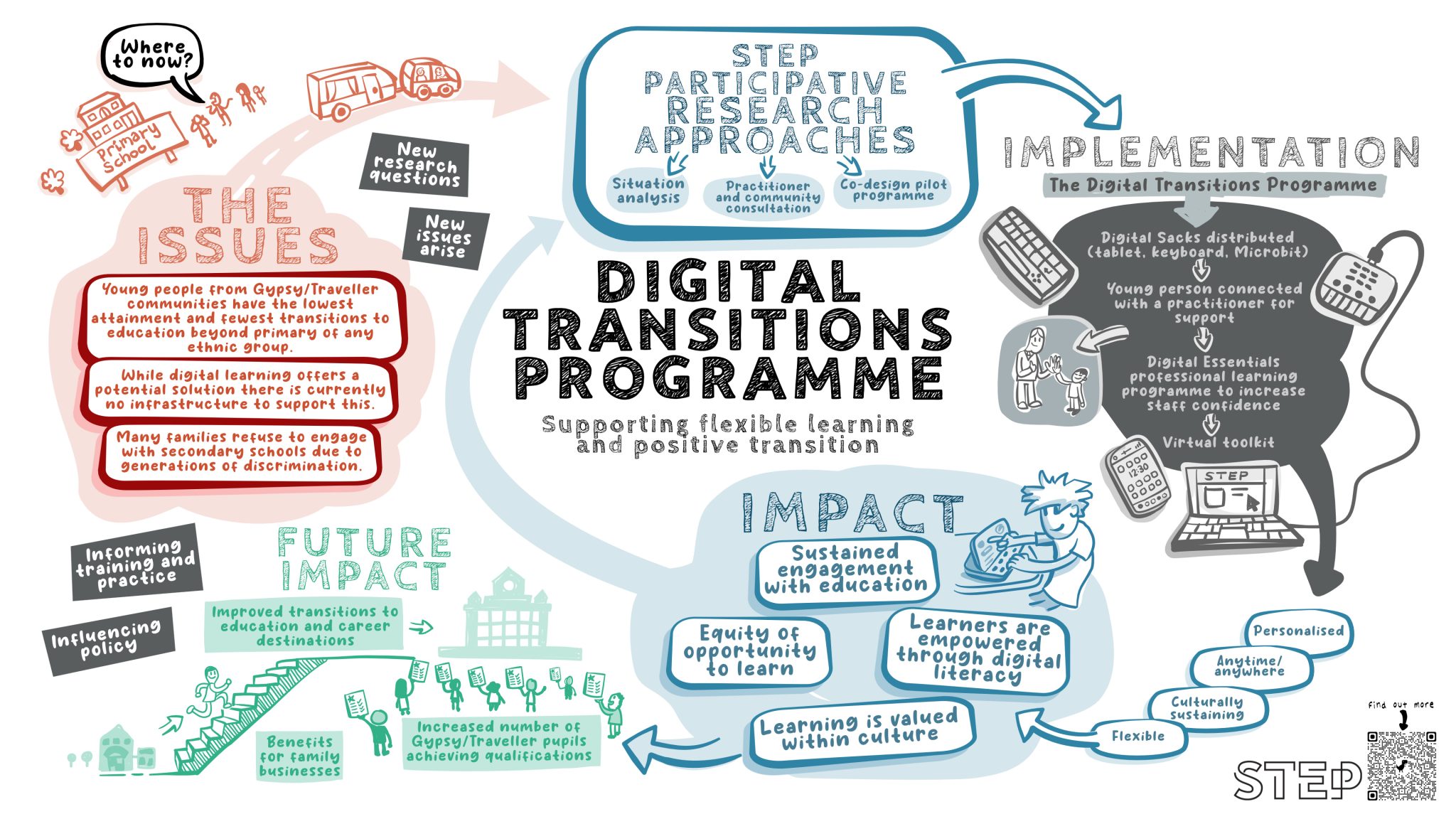Digital Transitions
Supporting flexible learning and positive transitions
Background
Gypsy/Traveller and Roma pupils have the lowest rates of transition to positive destinations beyond primary school of all minority ethnic groups. While families value education, the majority do not engage with secondary schools for reasons such as relevance to the culture and concerns about safety due to generations of discrimination. We recognise an urgent need for flexible culturally sustaining education models for young people from traditionally nomadic communities.
Digital learning is known to play a key role in providing inclusive education and social participation. STEP undertook research to understand the digital infrastructure needed to enable a viable model for secondary education for Gypsy/Traveller and Roma learners. Our research highlighted a range of issues to address such as digital poverty, a digital skills deficit among learners and parents, and service capacity to deliver effective digital learning
In response, STEP developed the Digital Transitions Programme, which comprises several elements: Digital Sacks with technology to support flexible learning, a virtual toolkit for ‘anytime, any place’ access to materials, and a professional learning programme to improve staff confidence and capacity to facilitate digital learning.
Programme components
- Digital Sacks containing technical kit address the digital poverty gap and support equity of access. The Sacks aim to improve transitions using a culturally sustaining model that supports flexible learning and participation in education even when travelling. The Sacks are tailored to the specific needs of nomadic young people to mitigate known barriers to education.
- Participating young people are linked with a practitioner who supports and sustains engagement through a culturally sustaining curriculum.
- The virtual toolkit provides young people and staff with information to get started with the Digital Sack. It also provides resources and learning materials that can be accessed ‘anytime, anyplace’.
- Digital Essentials sessions offer practitioners opportunities to improve knowledge and skills to support digital learning. Visit the events page for more details.
How to get involved
The initiative is open to TENET members and other education professionals working with young people in upper primary and secondary phases from the Gypsy/Traveller and Roma community who require digital technology to support flexible learning and positive transitions. Please refer to our qualifying criteria and key information. We have limited places so please get in touch as soon as possible to discuss taking part.
Digital Transitions Programme Padlet: Your guide to participation
Digital Quick Start Guide (English)
Ghidul rapid al ghiozdanului digital (Romanian)
Explore our pathway to impact and pilot data graph here

The virtual toolkit



Getting started with your Digital Sack
Here’s your quick guide to what’s in the STEP Digital Sack. Please get in touch directly for one-to-one support.
Digital Basics Toolkit
Want to learn skills to help you set up a computer or tablet device? Want to learn how to set up your first email address or how to connect to wifi? This is the place! You’ll find useful videos and information to help you build your digital skills.
Staying safe online
Useful organisations and important information to share with young people about using technology and online content in safe, critical and responsible ways.
Digital Learning resources
Digitally learning opportunities are endless. Explore some of the most useful sources for learners from traditionally nomadic communities, including the STEP learning app, upskilling courses, creative tools and educational platforms.
Accesibility resources
Explore some of the most useful sources for learners and family members from traditionally nomadic communities to help support reading, writing and low confidence with literacy.
BBC Mirco:bit resource hub
What is a BBC Micro:bit? We’ve compiled resources and information to help you get started with your pocket-sized computer.
Wider achievement and awards
There a many ways to get qualifications and awards. We’ve collated some of the most popular and successful opportunities as recommended by our teacher network.
for young people
Young people can also visit our Digital Zone for more programme information and resources.